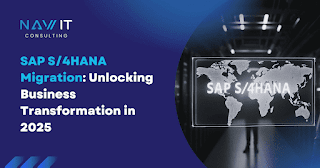SAP ERP vs. SAP S/4HANA: What's the Difference and Which Is Right for You?
In the fast-evolving world of enterprise technology, selecting the right ERP (Enterprise Resource Planning) solution can make or break your digital transformation journey. For many organizations using SAP ERP (ECC), the question isn't whether to upgrade, but when and how to move to SAP S/4HANA.
Both systems aim to integrate and streamline core business functions—like finance, supply chain, procurement, and human resources—but they differ significantly in architecture, performance, and long-term value.
What Is SAP ERP (ECC)?
SAP ERP, often referred to as ECC (ERP Central Component), has been a cornerstone for large enterprises for over two decades. It’s built on a modular structure and runs on traditional databases like Oracle or SQL Server. While functional and reliable, SAP ERP was designed for on-premise environments and lacks the flexibility and speed modern businesses now demand.
What Is SAP S/4HANA?
SAP S/4HANA is the next-generation ERP suite that runs exclusively on the SAP HANA in-memory database. This modern system processes massive amounts of data in real time, offers a simplified data model, and features SAP Fiori, a sleek, user-friendly interface designed for mobile and web.
S/4HANA is not just an upgrade—it’s a complete overhaul, built to support real-time analytics, automation, and future-ready innovations like AI and machine learning.
Key Differences
-
Database: SAP ERP uses traditional disk-based databases. S/4HANA leverages in-memory computing for lightning-fast data access.
-
User Interface: SAP ERP relies on SAP GUI, while S/4HANA features the modern, intuitive SAP Fiori.
-
Data Handling: S/4HANA removes redundant data structures and enables real-time insights.
-
Deployment: SAP ERP is mainly on-premise. S/4HANA offers cloud, on-premise, and hybrid options.
Why Upgrade to S/4HANA?
SAP has announced end of support for ECC by 2027, with extended support to 2030. Beyond compliance, migrating to S/4HANA means:
-
Faster decision-making with real-time data
-
Lower total cost of ownership through simplification
-
Better user experience
-
Readiness for cloud, IoT, and AI integration
Final Thoughts
The decision between SAP ERP vs. SAP S/4HANA comes down to your business goals. If you’re looking for stability and have custom legacy systems, SAP ERP might suffice for now. But if you’re aiming for agility, innovation, and long-term growth, S/4HANA is the clear choice.
Start your migration planning early and take advantage of SAP’s tools and best practices. The sooner you make the move, the sooner your business can leverage the full power of intelligent enterprise solutions.


Comments
Post a Comment